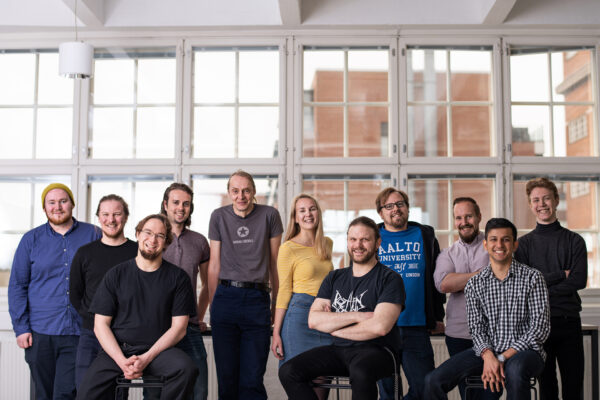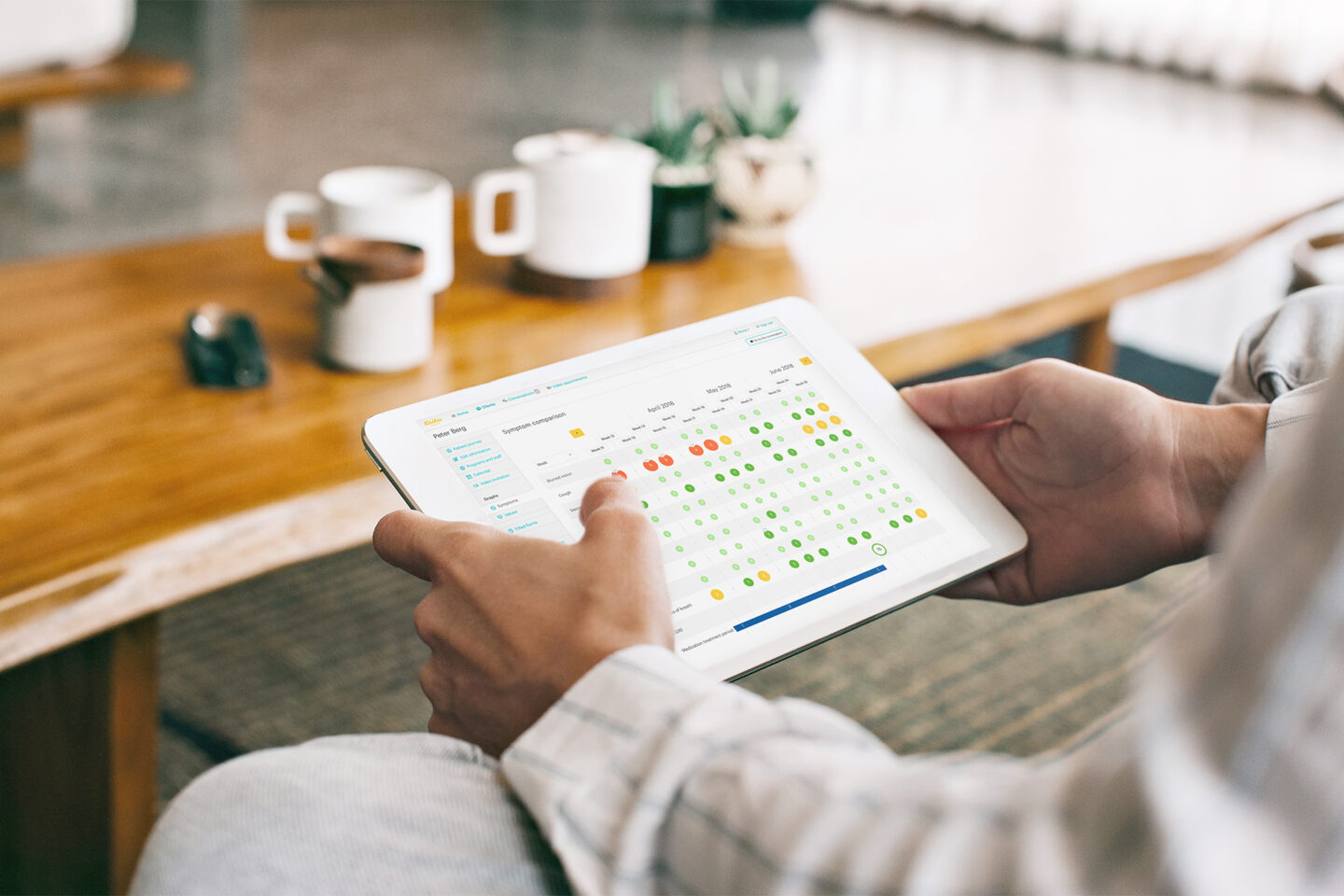A pioneer in digital patient-monitoring, Kaiku now occupies a position where Lauri Sippola commands an audience in the corner offices of large corporations. He says he fitted in a discussion with Bill Anderson, CEO of Roche Pharmaceuticals, at Finland’s Slush startup and tech event. Roche is the world’s largest biotech corporation and currently Kaiku’s cooperation partner. How did a Finnish startup manage to travel so far? Sippola and Joni Karsikas list four steps:
1. The right place at the right time
One key to Kaiku’s success was right timing. Sippola points out that the company made slower progress than expected in the early years, but the operating environment has since matured enough to understand and appreciate what Kaiku offers. The COVID-19 pandemic, at least, has made even large healthcare organisations sit up and take note of how useful digital services can be.
“We’ve had our share of luck on the way. We had time during the quieter spell to carefully and fully develop both our software and our operating model, and to conduct the studies needed to demonstrate their safety and efficiency. Without that, it would have been difficult, or even impossible, to move forward,” says Sippola.
Karsikas believes Kaiku has made rapid progress given the conservative attitude of the sector.
“An early-stage healthtech company could take a decade to reach its commercial potential. Kaiku reached it quickly and started to solve the real problems of paying customers. Many companies could learn from Kaiku on this matter,” comments Karsikas.
2. A unique product that solves a problem
Kaiku has been aiming for international success from the very start. The five co-founders, Lauri Sippola, Joel Lehikoinen, Otto Seiskari, Henri Virtanen and Kaarlo Haikonen, established the company in 2012, while studying programming at Aalto University. Half of Sippola’s family are doctors, and half engineers, so it was a natural step for Sippola to look for a team to solve problems in healthcare in particular.
“We set out to study how digital solutions could be applied to improving patient care. We found that cancer patients have a lot of questions and concerns, but communications with nursing staff were not always adequate. On the other hand, continuous monitoring of a patient’s symptoms and detecting any adverse effects of treatment is critical to patient outcomes. So, we started to develop an application that could help solve both problems,” Sippola says.
The Kaiku application runs on a smartphone, tablet and computer that stays with the patient. The device interviews the patient during and after treatment. It also offers the patient information relevant to their situation. Nursing staff stay updated on the patient’s status so, if necessary, they can react to symptoms or intervene very quickly.
“Kaiku can even predict a patient’s symptoms. We are the first to have released intelligent prediction models that can forecast symptoms related to certain cancer treatments before they even appear. That allows timely intervention,” Sippola says.
The second key to success is a unique and innovative product that solves a problem. “It is our algorithm, in fact, that has given us a place at the same table as global leaders in this field,” comments Sippola.

3. Ambitious goals
The third key to success was an ambitious attitude and hard work. Kaiku wanted to be best in the world and thought hard about how to achieve that goal. The company’s first paying customer was the Docrates Cancer Center in Finland, which deployed Kaiku’s application in 2012.
“We immediately started looking for international partners from among the world’s leading hospital groups. The second paying customer was the Swiss private hospital group Hirslanden,” recalls Sippola.
Services for oncology clinics and patients can only be fine-tuned in cooperation with them. Kaiku has benefitted from getting prestigious hospitals as partners so quickly.
Research at university central hospitals has shown that collecting patients’ subjective experiences and turning them into structured data can have a significant impact on care outcomes. It can also produce considerable savings in costs.
4. Sufficient financing
The lead investor for Kaiku’s seed financing round was Reaktor Ventures. Several private investors also lent their support to the young company, including Olli Riikkala, Jaakko Ollila and Kustaa Piha. Business Finland provided help for the company’s product development.
The main investors in a later Series A financing round were Tesi and the Innovation Fund of Debiopharm, a Swiss pharmaceutical group. Tesi and Debiopharm have co-invested before as well, and both were unaware the other had an eye on Kaiku.
Tesi always makes its investment decisions on market terms, expecting good returns from its investments. Even at the time of investing, it is evident that ownership will be divested at the appropriate time. Joni Karsikas points out that the time span can be longer than that of many other investors, but when a company has reached the right phase Tesi will exit from its investment. When and how depends on the company.
In the main picture: Kaiku Health’s intelligent digital monitoring collects patient’s experiences and turns them to structured data.
Read more: “This is exactly what we’ve been aiming for” – Kaiku Health continues under new ownership
Kaiku Health
What it is: A software company established in 2012. Developed a digital platform for intelligent patient monitoring. Founders: Lauri Sippola, Joel Lehikoinen, Otto Seiskari, Henri Virtanen and Kaarlo Haikonen. Based in Helsinki.
Product: Kaiku Health’s digital platform is used in routine care by over 60 oncology clinics and hospitals in Europe. It is deployed in many university hospitals in Finland. Revenue model is Saas, Software as a Service.
Personnel: Over 50 employees.
Owners: Swedish listed company Elekta, global market leader in precision radiotherapy. 4,000 employees. Head Office in Stockholm.
Websites: kaikuhealth.com, elekta.com
Lauri Sippola
Who he is: CEO and co-founder of Kaiku Health
Education: MSc in Industrial Engineering and Management, Aalto University.
Experience: 20th employee of REFLEX Solutions. In 2019, REFLEX raised €175m in funding from TCV, which has also invested in, for instance, Facebook.
Special: Included in MIT Technology Review’s Innovators under 35 Europe list. A keen football fan who plays in the 5th division.
Joni Karsikas
Who he is: Investment Director in Tesi’s Venture capital team since 2017. Responsible for investments in healthtech companies, in particular, and for developing current portfolio companies.
Education: MSc, BA (Lappeenranta University of Technology)
Experience: From 2011, project manager in KPMG’s Global Strategy Group, working with acquisition and growth strategy.
Special: Father to newly born Lukas and enthusiastic football fan.




